
8 minute read
Jesus Said, Explaining the Gospel Message: Father Brady Williams, SOLT recreates the setting of the most famous sermon ever preached
A reflection of Sermon on the Mount
By Father Brady Williams, SOLT
Contributor
One time I opened a box of Tazo Calm tea, and on the teabag packaging, there was a brief message that read something like: “One cup of Tazo Calm tea is like sitting down in an alpine valley for fifteen minutes with your shoes off.” If Tazo tea could do something like that, what would sitting and reflecting on the Sermon on the Mount do (shoes optional)?
Some say it would take a moderate reader only about 13 minutes to read the estimated 2000 words of the most famous sermon ever preached. While Tazo Calm offers a brief repose in an alpine valley, the great words of Jesus promise the heights of pure happiness!
“Seeing the crowds, [Jesus] went up on the mountain, and when he sat down, his disciples came to him. And he opened his mouth and taught them saying: ….” (Mt 5:1-2).
Jesus invites his disciples to come to him on the mountain. The Sermon on the Mount (Matthew 5-7), and particularly the Beatitudes, are a kind of ‘word picture’ of Jesus himself. He is the poor, meek, merciful One who thirsts to fulfill all righteousness, who is pure of heart and who is our peace, and whose way of life will be a cause of persecution. He is not only the giver of the New Law but also its perfect exemplar.
The “Sermon on the Mount” is both the panoramic view at the top of the mountain revealing the marvelous vistas of holiness and the path to true happiness that occurs when we conform our lives more perfectly to Christ: “You, therefore, must be perfect, just as your heavenly Father is perfect” (Mt 5:48).
We, as Jesus’ disciples, ought to turn to the Sermon on the Mount frequently to find the answer to our desire for happiness in life and to strive for greater perfection. The Sermon on the Mount can be a useful guide for examining our conscience, helping us to identify those areas in our life that we need to change to be more Christ-like.
“You have heard that it was said, but I say to you ….” (Mt 5:27, 31, 33, 38, 43). The centerpiece of the Sermon on the Mount is Jesus himself. On the one hand, Jesus says: “You have heard ….” – this presents us with the opportunity to evaluate our thoughts, values, opinions, ways of thinking, analyses, decisions, etc., in the light of being a disciple of Christ. We could ask ourselves who the most prominent voices we tend to listen to and how they compare to the values, thoughts, and ways of thinking of Christ? On the other hand, Jesus gives a response: “but I say to you….” Here, we should receive in humble reverence the Word of God, willing to sit at his feet and listen in silence to what He has to say about this/that. Otherwise, we run the risk of Jesus’ words, “but I say to you…” just being one opinion among others and even being content with believing whatever we want (follow the prevailing view) or that Jesus must agree with me. Are we open to listening to Jesus’ words as entrusted to His Church, or are we too quick to view the Christian perspective as a little out-of-date to our modern view? I think we will find that the words of Jesus challenge us more often than we would like and in ways that are not always comfortable. It is necessary to allow the words of Jesus to sink in more deeply. Such a reading requires listening attentively to Him and for an atmosphere of silence to have a more prominent role in our lives. Perhaps in these very turbulent times, we need to go up the mountain once again to sit at the feet of the Lord and listen attentively to “what I say to you ….” His words will configure our lives to the Gospel so that we indeed become salt and light for the world (cf. Mt 5: 13 – 16). Jesus ends the Sermon on the Mount by saying that if we listen to these words and put them into practice, we are building our lives on solid rock (Mt 7:24), and will indeed be authentic Christians who have put on the mind of Christ and seek to fulfill his will in our daily lives. Perhaps in these very turbulent times, we need to go up the mountain once again to sit at the feet of the Lord and listen attentively to “what I say to you ….”
JESUS DIJO explicando el mensaje del evangelio
Una reflexión sobre el Sermón de la Montaña
Por el padre Brady Williams, SOLT
Contribuyente
Una vez, abrí una caja de té Tazo Calm, y en el paquete de la bolsita de té, había un breve mensaje que decía algo así como: “Una taza de té Tazo Calm es como sentarse en un valle alpino durante quince minutos sin zapatos. “ Si el té Tazo pudiera hacer algo así, ¿qué haría el sentarse y reflexionar sobre el Sermón de la Montaña (zapatos opcionales)?
Algunos dicen que al lector moderado le tomaría solo unos 13 minutos leer las 2000 palabras estimadas del sermón más famoso jamás predicado. Mientras Tazo Calm ofrece un breve descanso en un valle alpino, ¡las maravillosas palabras de Jesús prometen la máxima y más pura felicidad!
“Al ver las multitudes, [Jesús] subió a la montaña, y cuando se sentó, sus discípulos se acercaron a él. Y abrió la boca y les enseñó a decir: ... “. (Mt 5: 1-2).
Jesús invita a sus discípulos a venir a él en la montaña. El Sermón de la Montaña (Mateo 5-7), y particularmente las Bienaventuranzas, son una especie de “imagen de palabras” del mismo Jesús. Él es el pobre, manso, misericordioso, que tiene sed de cumplir con toda justicia, que es puro de corazón y que es nuestra paz, y cuyo estilo de vida será causa de persecución. No solo es el dador de la Nueva Ley, sino también el ejemplo perfecto a seguir.
El “Sermón de la Montaña” a la vez que nos da una vista panorámica desde la cima de la montaña, se nos revelan las maravillosas vistas de santidad y el camino hacia la verdadera felicidad que ocurre cuando conformamos nuestras vidas a la vida más perfecta, la de Cristo: “Por lo
SERMON ON THE MOUNT BY CARL BLOCH (1877) | PUBLIC DOMAIN
JESUS DIJO explicando el mensaje del evangelio
tanto, tu debes ser perfecto, así como tu Padre celestial es perfecto” (Mt 5:48).
Nosotros, como discípulos de Jesús, debemos recurrir al Sermón de la Montaña con frecuencia, para encontrar la respuesta a nuestro deseo por la felicidad en la vida y así, luchar por una mayor perfección. El Sermón de la Montaña, puede ser una guía útil para examinar nuestra conciencia, ayudándonos a identificar aquellas áreas de nuestra vida que necesitamos cambiar para ser más como Cristo. “Has oído que se dijo, pero Yo te digo ...”. (Mt 5:27, 31, 33, 38, 43). La pieza central del Sermón de la Montaña es Jesús mismo. Por un lado, Jesús dice: “Has oído ...”. - esto nos presenta la oportunidad de evaluar nuestros pensamientos, valores, opiniones, formas de pensar, análisis, decisiones, etc., a la luz de ser un discípulo de Cristo.
Podríamos preguntarnos cuáles son las voces más prominentes que tendemos a escuchar y cómo se comparan con los valores, pensamientos y formas de pensar de Cristo.
Por otro lado, Jesús da una respuesta: “pero Yo te digo ...”. Aquí, debemos recibir con humilde reverencia la Palabra de Dios, deseosos de sentarnos a sus pies y escuchar en silencio lo que tiene que decir sobre esto o aquello.
De lo contrario, corremos el riesgo de que las palabras de Jesús, “pero Yo te digo ...” sean tan solo una opinión entre otras, e incluso nos contentemos con creer lo que queramos creer (siguiendo el punto de vista predominante) quizás, como que Jesús debe estar de acuerdo conmigo. ¿Estamos abiertos a escuchar las palabras de Jesús como fueron confiadas a Su Iglesia, o somos demasiado rápidos como para tan solo darle un vistazo a la perspectiva cristiana, e interpretarlas como un tanto desactualizadas, para nuestros puntos de vista modernos?
Creo que descubriremos que las palabras de Jesús nos desafían con más frecuencia de lo que nos gustaría, y de maneras que no son siempre cómodas. Es necesario permitir que las palabras de Jesús se hundan más profundamente en nosotros.
Tal lectura requiere ser escuchada atentamente y que una atmósfera de silencio tenga un papel predominante en nuestras vidas.
Quizás en estos tiempos tan turbulentos, necesitamos subir a la montaña una vez más para sentarnos a los pies del Señor y escuchar atentamente “lo que Yo te digo ...”. Sus palabras configurarán nuestras vidas al Evangelio para que realmente seamos sal y luz para el mundo (cf. Mt 5, 13-16).
Jesús termina el Sermón de la Montaña diciendo que si escuchamos estas palabras y las ponemos en práctica, estamos construyendo nuestras vidas sobre roca sólida (Mt 7:24), y de hecho seremos cristianos auténticos que deseamos pensar como Cristo y buscamos cumplir su voluntad en nuestra vida diaria.

SS. CYRIL & METHODIUS CATHOLIC CHRUCH 3210 SOUTH PADRE ISLAND DR. CORPUS CHRISTI, TEXAS 78415
AGAPE
RELIGIOUS ARTICLE STORE (361)854-1853 AGAPE OPEN ALL WEEK RELIGIOUS ARTICLE STORE (361) 854-1853 OPEN ALL WEEK 8:15 a.m. to 1 p.m. 8:15 a.m. to 1 p.m. 2 p.m. to 7 p.m. 2 p.m. to 7 p.m.










